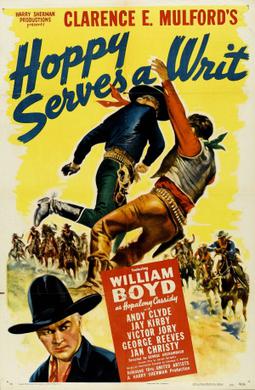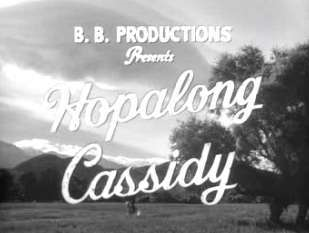| Genre | Western |
|---|---|
| Running time | 30 minutes |
| Country of origin | United States |
| Language(s) | English |
| Syndicates | Commodore Productions Mutual CBS |
| TV adaptations | Hopalong Cassidy |
| Starring | William Boyd Andy Clyde |
| Written by | Howard Swart Dean Owen Harold Swanton |
| Directed by | Ted Bliss |
| Produced by | Walter and Shirley White Charles Henry |
| Original release | 1948 – December 27, 1952 |
Hopalong Cassidy is a radio western in the United States, featuring the character Hopalong Cassidy created by writer Clarence E. Mulford. It was syndicated via electrical transcription, beginning in 1948 [1] and continuing into 1950. Its network broadcasts began on Mutual January 1, 1950, and ended on CBS December 27, 1952. [2]
CBS produced an audition episode of a Hopalong Cassidy program that was broadcast in the summer of 1941 as part of Forecast, a series of pilots for potential programs. [2] After that, little, if anything, was heard about a Hopalong Cassidy radio production until five years later. An item in Radio Life in 1946 commented, "Radio's gone western with a vengeance, as if you didn't know!" and reported that a radio version of the Cassidy movies would be heard "in the near future." [3] That "near future" turned out to be two years.
The program has been classified as both a "juvenile adventure program" [4] and a "western adventure drama." [2] As was true of the movies and television programs featuring Hopalong Cassidy, "the character was much more civilized than the rough-cut character portrayed in the novels" by Clarence E. Mulford. [4] In contrast, the revised Cassidy was described by radio historian John Dunning as "a knight of the range, a man of morals." [2] A newspaper story about the program's debut on Mutual commented, "The radio broadcasts will be specially scripted to highlight the personality, mannerisms and unusual adventures of the steely-eyed, justice-dealing, gun-toting cowboy hero." [5]
William Boyd played Hopalong Cassidy, as he had in the movies featuring that character. Dunning wrote: "Boyd had one of radio's perfect voices. His voice could do anything – comfort a bereaved widow one moment, scare the boots off her husband's killer the next. It was strong, virile, and straight to the point. And that Hoppy belly-laugh became famous. It was one of his trademarks." [6]
Andy Clyde, "the resident old coot sidekick from the later movies" had his same role in the radio program. [7] Each episode's opening referred to Clyde's character, California Carlson, as "'the same California you've laughed at a million times.'" [6]
After a slow start (when producers Walter and Shirley White "were paying production costs for new episodes as money came in from initial clients"), the popularity of Hopalong Cassidy on radio began to increase. [2] In 1948, a Hopalong Cassidy television series began, first shown on KTLA in Los Angeles, California. [8] That series included both edited versions of Cassidy's movies and new episodes made for TV. "One medium fed on the other," Dunning wrote, and "for two years [Boyd] was as big a media hero as the nation had seen." [2]
Both the radio and the television versions of Hopalong Cassidy benefited from the existing popularity the Cassidy character had developed through movies. The producers made good use of that popularity in promoting the syndicated program to stations and advertisers. An ad in the 1949 issue of Broadcasting Yearbook proclaimed:
"THIRTEEN YEARS OF MOTION PICTURE POPULARITY BEHIND IT! (NO OTHER RADIO SERIES CAN MAKE THIS CLAIM!) An action-packed film trailer will be shown in over 10,000 theatres announcing the radio series! "HOPALONG CASSIDY" comes to radio with a fabulous following ... a ready made audience for sponsors! [9]
The Six Shooter is a United States Western old-time radio program starring James Stewart as a gunfighter. It was created by Frank Burt, who also wrote many of the episodes, and lasted only one season of 39 episodes on NBC. Initially, it was broadcast on Sundays at 9:30 pm Eastern Time, through October 11. Then it was heard at 8:30 pm for three weeks. Finally, on November 8, 1953, through March 21, 1954, it was broadcast Sundays at 8 pm; beginning April 1, 1954, through the final episode, it was on Thursdays at 8:30 pm. One old-time radio directory called the program "a last, desperate effort by a radio network (NBC) to maintain interest in adventure drama by employing a major Hollywood movie star in the leading role."

William Lawrence Boyd was an American film actor who is known for portraying the cowboy hero Hopalong Cassidy.

Hopalong Cassidy is a fictional cowboy hero created in 1904 by the author Clarence E. Mulford, who wrote a series of short stories and novels based on the character. Mulford portrayed the character as rude, dangerous, and rough-talking. He was shot in the leg during a gun fight which caused him to walk with a little "hop", hence the nickname.
The year 1950 saw a number of significant happenings in radio broadcasting history.

Border Patrol is a 1943 Western film directed by Lesley Selander and written by Clarence E. Mulford and Michael Wilson. The film stars William Boyd, Andy Clyde, Robert Mitchum, Jay Kirby, George Reeves, and Duncan Renaldo. The film was released on April 2, 1943, by United Artists.

Andrew Allan Clyde, was a Scottish-born American film and television actor whose career spanned some 45 years. In 1921 he broke into silent films as a Mack Sennett comic, debuting in On a Summer Day. He was the fifth of six children of theatrical actor, producer and manager John Clyde. Clyde's brother David and his sister Jean also became screen actors.

Russell "Lucky" Hayden was an American film and television actor. He is best known for his portrayal as Lucky Jenkins in Paramount's popular Hopalong Cassidy film series.

The Paramount Television Network, Inc. was a venture by American film corporation Paramount Pictures to organize a television network in the late 1940s. The company-built television stations KTLA in Los Angeles and WBKB in Chicago; it also invested $400,000 in the DuMont Television Network, which operated stations WABD in New York City, WTTG in Washington, D.C., and WDTV in Pittsburgh. Escalating disputes between Paramount and DuMont concerning breaches of contract, company control, and network competition erupted regularly between 1940 and 1956, culminating in the DuMont Network's dismantling. Television historian Timothy White called the clash between the two companies "one of the most unfortunate and dramatic episodes in the early history of the television industry."
Frontier Town was an American radio adventure serial syndicated by Bruce Eells Productions. The 30-minute programme's first known broadcast was in 1949, and the show ran for 47 episodes. Because it was syndicated, it aired on different stations on different days. For instance, in New York City, the first episode ran on WINS on March 5, 1949.
Candy Matson was a radio program on NBC West Coast that aired from June 29, 1949, to May 20, 1951. It centered on Candy Matson, a female private investigator with a wry sense of humor and a penthouse on Telegraph Hill in San Francisco. The program was notable for having a striking female character "without a trace of squeamishness" as well as a veiled gay character in Candy's best friend Rembrandt Watson, voiced by Jack Thomas. Candy's love interest was police detective Ray Mallard, voiced by Henry Leff. The announcer was Dudley Manlove. Actors frequently heard in minor roles were Helen Kleeb, John Grober, Mary Milford and Hal Burdick. In addition to the show being set in San Francisco, it was produced at San Francisco Radio City.
Clarence Edward Mulford was an American writer, best known as the creator of the character Hopalong Cassidy.
Dangerous Assignment was an NBC Radio drama starring Brian Donlevy broadcast in the US 1949–1953, a syndicated television series distributed in the US 1951–52, and an Australian radio series broadcast in 1954-56 as remakes of the original American radio scripts.

The Adventures of Philip Marlowe was a radio series featuring Raymond Chandler's private eye, Philip Marlowe. Robert C. Reinehr and Jon D. Swartz, in their book, The A to Z of Old Time Radio, noted that the program differed from most others in its genre: "It was a more hard-boiled program than many of the other private detective shows of the time, containing few quips or quaint characters."

Gene Autry's Melody Ranch is a Western variety radio show in the United States. A 15-minute pilot show aired on December 31, 1939. The program ran from January 7, 1940 to August 1, 1943, and from September 23, 1945 to May 16, 1956. The show's entire run was broadcast over the CBS radio network, sponsored by Doublemint gum. The approximately two-year interruption resulted from Autry's enlistment in the United States Army to serve in World War II. Initially titled Doublemint's Melody Ranch, the show's name was changed to Gene Autry's Melody Ranch in early 1941. Episodes were 30 minutes long except for a 15-minute version that ran from September 23, 1945 to June 16, 1946. The theme song was "Back in the Saddle Again".
The Roy Rogers Show was a 30-minute Western radio program in the United States. It began in 1944, ended in 1955, and was carried on more than 500 stations. Because of demands on Rogers' time for personal appearances and making films, the show was one of the first radio series to be transcribed.

Hoppy Serves a Writ is a 1943 Western film directed by George Archainbaud and starring William Boyd as Hopalong Cassidy, the 43rd of 66 Cassidy features. The supporting cast features his regular sidekicks Andy Clyde and Jay Kirby, as well as Victor Jory and George Reeves. The film remains noteworthy today as one of the earliest screen performances of unshaven newcomer Robert Mitchum, who made an impression upon the studio by generating a surprising fan mail response exactly as Clark Gable had after playing an extremely similar unshaven role in The Painted Desert, a Western starring William Boyd produced a dozen years earlier.

Strange Gamble is a 1948 American Western film directed by George Archainbaud, written by Doris Schroeder, Bennett Cohen and Ande Lamb, and starring William Boyd, Andy Clyde, Rand Brooks, Elaine Riley, James Craven and Robert Williams. It was released on October 8, 1948, by United Artists.
For a broader look at the character on which this program was based, see Bulldog Drummond.
Hopalong Cassidy is a fictional cowboy hero created in 1904 by author Clarence E. Mulford who has appeared in a variety of media.

Hopalong Cassidy is an American Western television series that ran from 1949 to 1952 on NBC, starring William Boyd as Hopalong Cassidy, a fictional gunslinger who had been created by writer Clarence E. Mulford. It was the first Western television series. The series began as simply broadcasts of edited versions of previous Hopalong Cassidy films, all of which had starred Boyd. Eventually, the series transitioned to original episodes, with a new cast of characters and actors, notably Edgar Buchanan as Hopalong's sidekick Red Connors. The show was created and produced by Boyd.